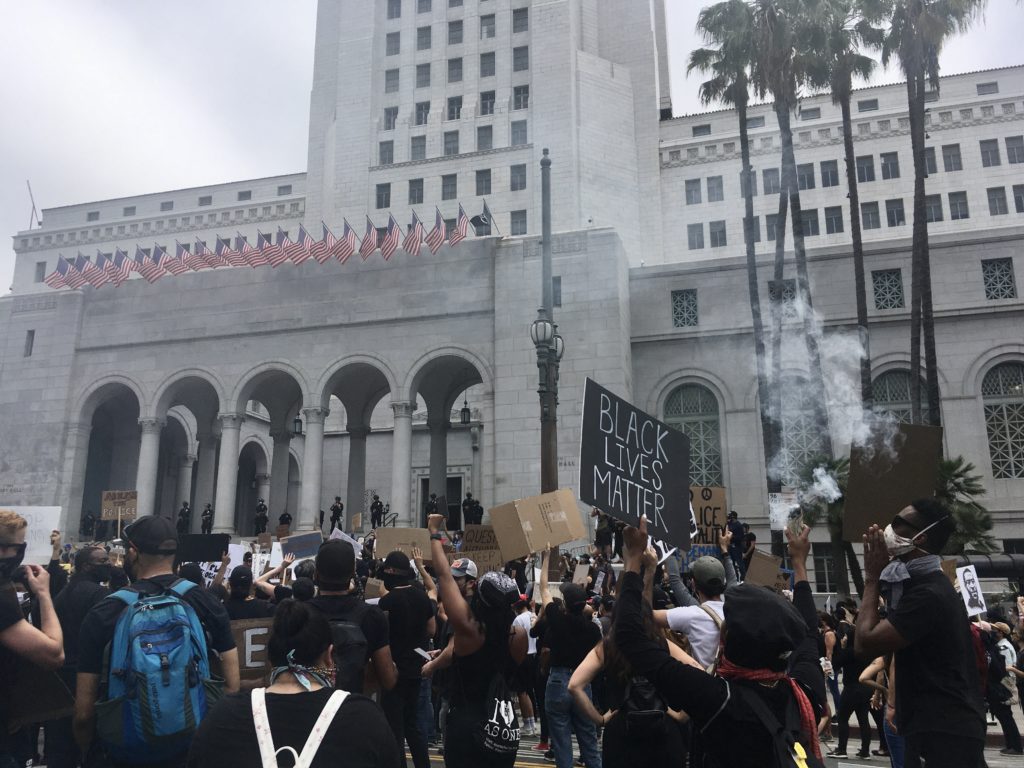
Image Description: Black Lives Matter demonstrators stand in front of Los Angeles City Hall on Tuesday, June 2nd, 2020. In the foreground, a masked person in black clothes holds a sign that reads “Black Lives Matter” in one hand and a bundle of burning sage in the other. In the background, a row of U.S. flags waves above the grey building’s arched columns, under which several armed police officers stand facing the protestors.
The Anthropology and Mental Health Interest Group stands in solidarity with the Movement for Black Lives and their calls to defund, disarm, and dismantle the police. We condemn white supremacy and all acts of anti-Black racism, xenophobia, and police brutality, which have profound consequences on the mental health of Black communities and all communities of color. We affirm that the world’s largest mental health facilities should not be U.S. county jails, which disproportionately house and treat Black and Brown people.(1) We condemn government-sanctioned domestic terrorism and the militarization of police forces against those who demand justice for Ahmaud Arbery, Breonna Taylor, David McAtee, George Floyd, James Scurlock, Nina Pop, Tony McDade, and others murdered by the U.S. criminal justice system.
In our discipline, in our professional organizations, in our academic institutions, and in the field, we must do more to combat historical, systemic, and institutionalized oppression and to build more sustainable and just communities. We know that universities are conduits of institutionalized racism, and we see that reflected in our administration, our faculty, and our student body every day. Given this, our members must do more to welcome Black students and all students of color in our field. We must listen deeply, reflect, and act on our commitments to further equity and celebrate diversity in our profession, as a practice of our discipline’s core values. We must also recognize the mental toll our students are facing, in light of the COVID-19 pandemic, high unemployment rates, and national uprisings, and we call on our discipline and all academic spaces to accommodate our students’ mental health needs and create supportive, caring classrooms that reflect the additional mental burdens associated with living through these hard times.
Below is a list of anthropological articles on the Movement for Black Lives and articles written by White Coats 4 Black Lives, a group of medical students and other health care providers committed to racial justice in health professions education. We have also created a Google Drive folder with full articles posted there, for those without institutional access.
Suggested Readings
The Anthropoliteia #BlackLivesMatter Syllabus Project. See link.
Auston, Donna. (June 29, 2016). On the Ground 3: Finding Black Death on a Quiet Hilltop. Anthropology News.
Bonilla, Yarimar, and Jonathan Rosa (2015.) #Ferguson: Digital Protest, Hashtag Ethnography, and the Racial Politics of Social Media in the United States. American Ethnologist 42(1): 4– 17.
Camp, Jordan T. and Christina Heatherton, eds. (2016). Policing the Planet: Why the Policing Crisis Led to Black Lives Matter. New York: Verso.
Charles, Dorothy, Himmelstein, K., Keenan, W., et al. (2015.) White Coats for Black Lives: Medical Students Responding to Racism and Police Brutality. Journal of Urban Health. 92, 1007-1010.
Garvey, Amy, Gomez, J., Pottinger, S., and White-Stern, A.P. (2016). White Coats for Black Lives: Young Voices Within Medicine. American Journal of Public Health. 106, 1752-1753.
Henderson, F.B. and Louis, B.M., Jr. (2017). Black Rural Lives Matters: Ethnographic Research about an Anti‐Racist Interfaith Organization in the U.S. South. Transforming Anthropology, 25: 50-67. doi:10.1111/traa.12097
Munyikwa, Michelle. (2017), Racialization, Affect, and Refuge. Anthropology News, 58: e226-e229. doi:10.1111/AN.337
Thompson, Vilisa. (September 7, 2016) Disability Solidarity: Completing The ‘Vision For Black Lives’. The Huffington Post. https://www.huffpost.com/entry/disability-solidarity-completing-the-vision-for-black_b_57d024f7e4b0eb9a57b6dc1f
Ture, Kalfani. and Angelo Gualtieri, A. (2017). Baltimore and Beyond: Racialized Ghettos, Violence, and the Role of Anthropology. Transforming Anthropology, 25: 3-10. doi:10.1111/traa.12094
Williams, Bianca C., ed. (June 29, 2015). #BlackLivesMatter: Anti‐Black Racism, Police Violence, and Resistance. Hot Spots, Society for Cultural Anthropology. http://www.culanth.org/fieldsights/696-blacklivesmatter-anti-black-racism-police-violence-and-resistance
Additional Readings
Davis-Mcelligatt, Joanna. (2018). Hands up, don’t shoot teaching black lives matter in Louisiana. South, 50(2), 114–125.
Jenks, Angela. (2016). “‘The Uses of Anger’”: Confronting Racism in the Classroom.” Teaching Anthropology: Proceedings of the 2015 AAA Meeting. Society for Anthropology in Community Colleges. 21(1).
Maskovsky, Jeff and Piven, Francis Fox. (2020). We Need a Loud and Fractious Poor. Antipode, 52: 380-392. doi:10.1111/anti.12605
Ralph, Laurence. (2020). Torture without Torturers: Violence and Racialization in Black Chicago. Current Anthropology 61, no. 21, S87-S96.
Work Cited
- Eric Westervelt. February 25, 2020. “American’s Mental Health Crisis Hidden Behind Bars. NPR. https://www.npr.org/2020/02/25/805469776/americas-mental-health-crisis-hidden-behind-bars
